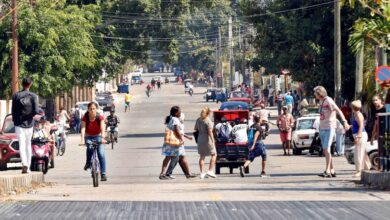As U.S. restrictions tighten, women seeking abortions hit the road
Nine of the 50 U.S. states this year passed legislation restricting abortion. Among the strictest were bans on abortion after a fetal heartbeat is detected

Medical office with ultrasound machine. Reference Image / Pixabay
Thomson Reuters Foundation | Ellen Wulfhorst
Listen to this article
Leer en español: A medida que las restricciones se endurecen, las mujeres buscan abortos en otros lugares
Nearly a half century ago, women with unwanted pregnancies would cross state lines seeking abortions that were legal in New York but banned in many other states across the country
Now new restrictions on abortion access are forcing women in several states to take similar measures and travel far from home to end pregnancies, health-care providers and supporters said.
"We've had patients from Texas, from Georgia. We've had a patient from Alabama," said Merle Hoffman, who runs Choices Women's Medical Center, which provides abortions, in New York City.
"Definitely it's picked up in the last few months," she told the Thomson Reuters Foundation.
Nine of the 50 U.S. states this year passed legislation restricting abortion. Among the strictest were bans on abortion after a fetal heartbeat is detected, which can occur at six weeks, even before a woman realizes she is pregnant.
Most of the new laws are facing legal challenges before they take effect.
The 1973 U.S. Supreme Court Roe v. Wade decision guarantees the right to abortion, but many states have added complications such as mandatory waiting periods, multiple visits or requiring pregnant women to view fetal ultrasound images.
Women facing such restrictions are turning to linked networks of abortion rights supporters to help them travel for access to health care, advocates said.
The informal networks have been dubbed an 'Overground Railroad,' referencing the 19th-century Underground Railroad of abolitionists who shuttled slaves out of the American South.
Some grassroots networks provide funds while others offer women transportation or a place to stay, said Elizabeth Nash, senior state issues manager at the Guttmacher Institute, a research group that supports abortion rights.
It's a way for abortion rights supporters to step up "when they see their lawmakers falling down on the job," Nash said, adding, "I don't see it slowing."
But Eric Scheidler, executive director of the Chicago-based Pro-Life Action League, which opposes abortion, said such networks "violate the spirit of state laws."
"Most fundamentally, they violate the basic justice due to the unborn child," he said. "We've protested those groups, and we try to raise awareness about what they're doing."
Also read: Norway detects radioactive iodine by Russian border days after blast
MORE PATIENTS LOGGING MORE MILES
Groups making abortion travel possible include the Washington-based National Abortion Federation, which helps women through a hot line and referrals.
"What we have seen is an increase in the mileage people are having to travel, because they're having to leave the state," said the Rev. Katherine Ragsdale, interim president and chief executive.
This year, compared with 2017, fewer women have traveled 50 miles or less for abortions, while more women have had to travel further, including those who have traveled over 300 miles, she said.
Donation-supported Arkansas Abortion Support Network, based in Little Rock, helps with expenses as well as travel arrangements to New Mexico and Colorado for later-term procedures, said founder Rosalind Creed.
Arkansas's ban on abortion beyond 18 weeks was recently blocked in federal court, but remains under legal challenge.
"You've got travel expenses that are huge, plus the procedure costs that are huge," Creed said. "Arkansas is a pretty poor state. Most of the people that we sponsor are in situations where a $200 car bill would put them in disaster."
New York City recently became the nation's first city to fund abortion directly, budgeting $250,000 for the New York Abortion Access Fund (NYAAF) to help some 500 women.
"As it gets harder for people to access abortion in conservative states, NYC will likely see an increase in out-of-state folks," NYAAF said in a statement.
Also read: Is diabetes keeping you up at night?
PATIENTS SEEKING PRIVACY
Other networks are cropping up around the country, said Guttmacher's Nash, including in Washington and Philadelphia.
"We are seeing a growth in these kinds of networks," she said. "Part of that is because we've seen clinics close, part of that is because there is limited access in some places."
While drug-induced medical abortions are an option not requiring travel, one of the drugs for ending pregnancy, mifepristone, has only limited availability.
And sometimes women travel to New York for privacy they cannot find at home, said Esther Priegue, Choices' director of counseling.
"They say if you walk into a place, people would know why you were there," Priegue said. "Small towns are small."
Hoffman's first out-of-state patient arrived in 1971, a year after abortion was decriminalized in New York.
Recently, she said a pregnant woman flew across the country to New York's LaGuardia Airport from Montana, where Guttmacher said most counties do not have clinics.
The woman would have had to drive six hours round-trip to reach a clinic in her rural western home state, Hoffman noted.
"She was a single mother and she just couldn't spend the time, so she decided 'Well, I'll just fly into LaGuardia,'" Hoffman said.
"It made sense in her mind."





